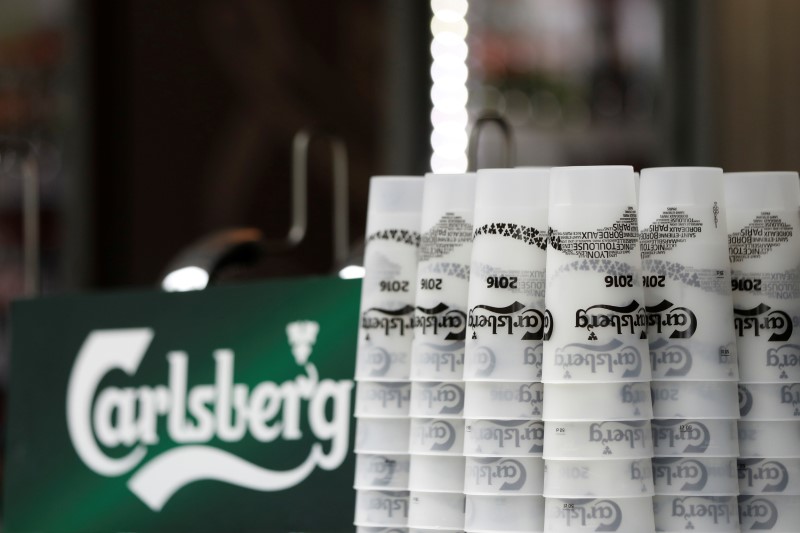By Jacob Gronholt-Pedersen
COPENHAGEN (Reuters) - Danish brewer Carlsberg (CO:CARLb) raised its full year profit outlook on Thursday after second-quarter sales beat forecasts on growing demand for its expensive beers in China and strong sales in Russia during the World Cup.
Carlsberg, the world's third-largest brewer behind Anheuser Busch InBev (BR:ABI) and Heineken (AS:HEIN), turned more positive on its 2018 outlook after a successful strategy to focus more on premium beers, especially in China, in the first half of the year.
The company now expects operating profit to grow by high-single-digits in percentage terms this year. It had previously forecast growth in mid-single-digits.
Shares in Carlsberg were trading around 4 percent higher, outperforming a 1.2 percent rise in Denmark's benchmark index (OMXC25CAP).
"There's more than good weather to these results. What lifts the earnings is that they've sold more expensive beers. They have really good growth in premium, craft and non-alcoholic beers, which is very positive," said Sydbank analyst Morten Imsgard.
The group's price mix, which indicates that the company sold more of its expensive beers, improved by 2 percent in the first six months of the year and was positive across its major regions: Europe, Russia and Asia.
In China, which last year became Carlsberg's largest single market in volume terms, sales grew organically by 17 percent in a market that grew by an estimated 1 percent, fuelled by demand for its premium brands like Tuborg, Carlsberg and 1664 Blanc.
The Chinese market is driven by international premium beer brands, which sell at two to three times the price of mainstream brands.
GOOD START
"We delivered strong results for the first six months of 2018 with healthy top-line growth, margin improvements across the regions, strong cash flow and continued debt reduction," said Chief Executive Cees't Hart, adding that the brewer has had a "good start to the third quarter".
The brewer has been losing ground to rivals in Russia, which accounts for around a fifth of sales. But volumes there rose 10 percent in April-June following an 11 percent decline in the first quarter, the brewer said.
Since Carlsberg took control of Russian brand Baltika a decade ago, it has struggled in its main Eastern European market, hit by a weak economy, restrictions on advertising and tax hikes designed to curb drinking.
"We see some growth this year, but remain cautious on Russian market, where consumer sentiment remains low," Hart said on a conference call.
In 2015, Hart launched a major cost-cutting program and a strategy to revive growth, which has been subdued since the company took over Baltika.
Hart said he now expects net benefits from the cost-cutting program to exceed a previous forecast of 2.3 billion crowns.
Carlsberg's total sales in the second quarter rose to 18.3 billion Danish crowns ($2.80 billion), slightly above the 18 billion crowns expected by analysts in a Reuters poll.
